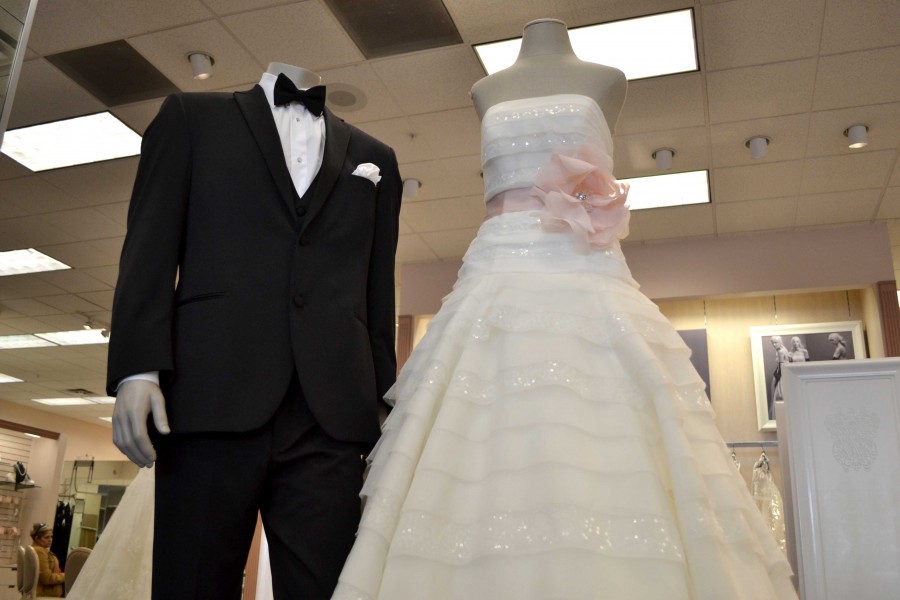According to a 2010 report done by the Pew Research Center, 26 percent of young people in their 20s are married. This is compared to 68 percent of 20-somethings in 1960.
The report calls the decrease in marriages the “marriage gap,” which is aligned with a growing income gap. The survey found that those lower on the socio-economic ladder are just as likely to marry as those with secure, well-paying jobs, but noted that they do place a higher premium on economic security as a condition
for marriage.
The survey also found that young men are likely to view cohabitation without marriage as favorable.
Senior art major Veronica Chaparro is 22 years old. She and her 24-year-old boyfriend of two years are among the 74 percent of 20-somethings that have not jumped the broom. Finances and higher education are the reason behind the delay.
“We talk about marriage all the time even though we are not engaged. We have dreams and hopes about our future and one day we will get there,” Chaparro said. “We are both striving to become successful in our careers and our focus is on each other and ourselves to reach our goals.”
According to a survey conducted by TheKnot.com and the WeddingChannel.com, the average wedding in the United States costs $29,858, excluding the cost for a honeymoon.
“He wants me to graduate and follow my dreams,” Chaparro said. “I want him to follow his dreams of going back to school and get another degree and once we have helped each other, we can then grow a family and our marriage.”
The average income for someone with a high school diploma is $30,000, and with a bachelor’s degree the income increases to $46,900, according to the U.S. Department of Education.
TheKnot.com and WeddingChannel.com survey also found that Utah and West Texas have the youngest brides, ranging on average from 25.7 to 26.7 years old.
Despite delaying marriage due to finances and life goals, Chaparro said that this isn’t the case for other young people.
“I don’t see it as a common issue in our generation,” she said. “I constantly see people on Facebook getting engaged and getting married who are my boyfriend’s and my age. Some couples tell us, ‘Oh, just go get married at the courthouse. It’s the same thing.’ But it is not the same for us. Our bond is greater than a piece of paper, and we want to share it with those we love.”
Junior multidisciplinary studies major Melody Samifua is 22 years old and has been married for two years. She said that marriage could be beneficial when it comes to finances because of combined income.
“I think financial reasons are a factor but sometimes it is easier with two people or if you guys have a plan and have two incomes that is easier if you are living on your own,” Samifua said.
Samifua said that although finances are not as much of a problem, time and married life can sometimes take its toll. Samifua’s husband is in the military. When they were stationed here, her credits from her previous university didn’t transfer, which has delayed her graduation.
“I was a junior back home and then we came out here so I had to still be a junior not a senior because all my credits didn’t transfer so it was harder trying to finish school and balance being married and cooking and stuff and working,” Samifua said.
Unlike the average American who spends $29,858 on a wedding, Samifua said she spent less than one-eighth of that on her wedding. She said if you really want to get married and make it work, there are ways, it just depends on the couple.
“We spent about $2,000 to $3,000 we had a ceremony at our church and then just rented out a building for afterwards, and food, and decorations,” Samifua said. “We kept it really simple because that is money you are wasting and could be saved for your marriage or for your student loans, I just see it a completely different way.”
In an interview conducted earlier this year, associate director of the University Career Center, Betsy Castro-Duarte weighed in on the delay of big-life decisions amongst students.
“I think once they find their comfort level and develop a skill set, things come at a certain point,” Castro-Duarte said. “They want to be secure in their job and sometimes it takes them longer to find a job, which delays them getting married and delays them buying items like cars and houses.”
Regardless of the situation, with cost of living increasing every year, the cost of getting hitched will increase as well. Millennials and the upcoming generations will continue to be faced with the burden of love and money.
For Chaparro, marriage is in the cards but not until she’s ready financially, mentally and spiritually.
“We want to accomplish our dreams and then share our dreams with each other and with our future family. Our happiness and love can only help our future grow,” Chaparro said.
Amanda Guillen may be reached at [email protected].







